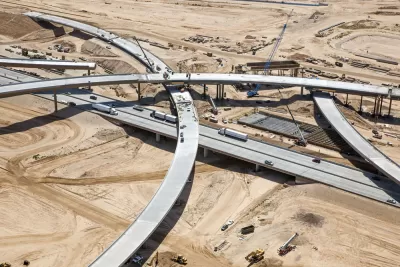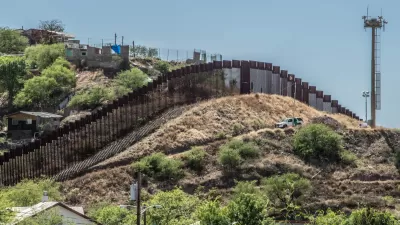Public-private partnerships between local governments and private contractors have the Trump Administration's favor. But in a "P3 market in its infancy," can they cut costs or simply line pockets?

Cited by the Trump Administration as an effective means to build out infrastructure, public-private partnerships let local governments work directly with private companies. Not to be confused with public-private initiatives of the philanthropic variety, "PPPs" or "P3s" prompt a lot of debate.
Matthew Goldstein and Patricia Cohen write: "Companies can complete projects quicker and more cheaply than governments can, proponents say. Letting private industry take the lead can also limit the amount of debt that cities and states need to take on."
Overall, the authors appear unconvinced. "And whatever the advantages of giving the private sector a stake in public works — rather than leaving the government in control — experts agree that while some public-private partnerships may result in near-term savings, there is little hard evidence that they perform better over time."
Cohen and Goldstein note that P3 deals are more common in Canada and overseas due to a bigger municipal bond market in the United States (and a correspondingly smaller P3 market). The worry is that if they're implemented more often in this country, P3s will fail to cut costs, instead transferring them to the public via long-term contracts.
FULL STORY: Public-Private Projects Where the Public Pays and Pays

Alabama: Trump Terminates Settlements for Black Communities Harmed By Raw Sewage
Trump deemed the landmark civil rights agreement “illegal DEI and environmental justice policy.”

Study: Maui’s Plan to Convert Vacation Rentals to Long-Term Housing Could Cause Nearly $1 Billion Economic Loss
The plan would reduce visitor accommodation by 25% resulting in 1,900 jobs lost.

Planetizen Federal Action Tracker
A weekly monitor of how Trump’s orders and actions are impacting planners and planning in America.

Waymo Gets Permission to Map SF’s Market Street
If allowed to operate on the traffic-restricted street, Waymo’s autonomous taxis would have a leg up over ride-hailing competitors — and counter the city’s efforts to grow bike and pedestrian on the thoroughfare.

Parklet Symposium Highlights the Success of Shared Spaces
Parklets got a boost during the Covid-19 pandemic, when the concept was translated to outdoor dining programs that offered restaurants a lifeline during the shutdown.

Federal Homelessness Agency Places Entire Staff on Leave
The U.S. Interagency Council on Homelessness is the only federal agency dedicated to preventing and ending homelessness.
Urban Design for Planners 1: Software Tools
This six-course series explores essential urban design concepts using open source software and equips planners with the tools they need to participate fully in the urban design process.
Planning for Universal Design
Learn the tools for implementing Universal Design in planning regulations.
Caltrans
Smith Gee Studio
Institute for Housing and Urban Development Studies (IHS)
City of Grandview
Harvard GSD Executive Education
Toledo-Lucas County Plan Commissions
Salt Lake City
NYU Wagner Graduate School of Public Service





























